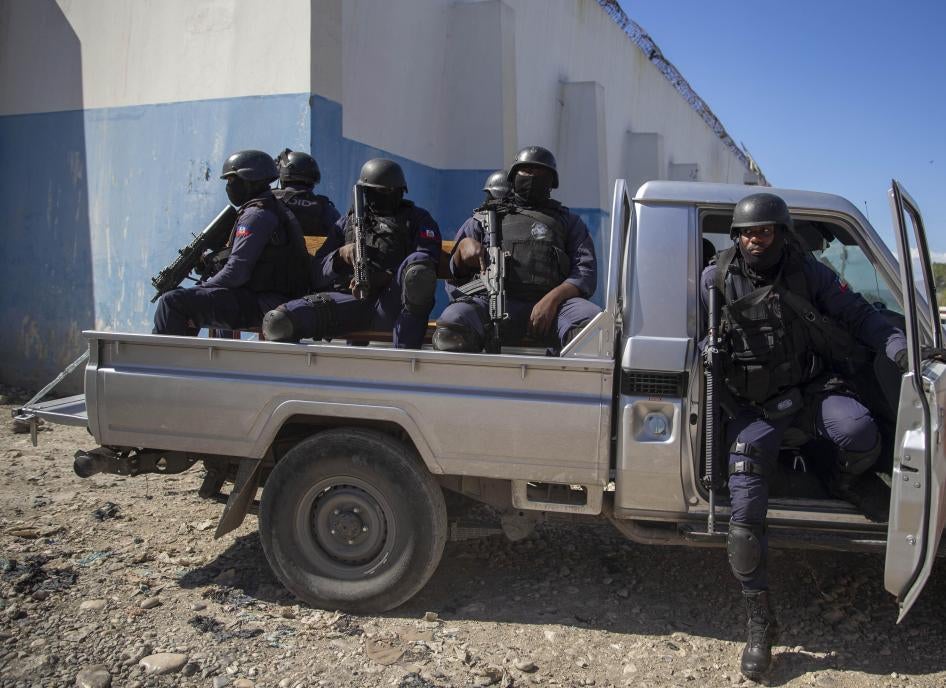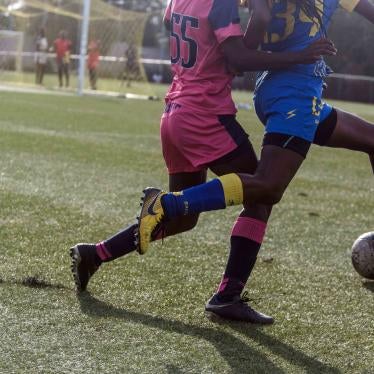(New York) – UN Security Council members should press the government of Haiti to uphold judicial independence, respect due process, and repeal its recent arbitrary changes to the Supreme Court’s composition, Human Rights Watch said today. They should also ensure that when extending the mandate of the United Nations Integrated Office in Haiti (BINUH), set to expire in October 2021, they take steps to strengthen an independent judiciary.
On February 22, the United Nations Security Council will discuss the ongoing political crisis in Haiti after a briefing from Helen La Lime, the head of BINUH, which was created in 2019 and mandated to advise the government of Haiti to promote and strengthen political stability and good governance. In early February, Haitian President Jovenel Moïse arbitrarily removed three Supreme Court justices, including one who was arrested for a few days in circumstances that the UN Office of the High Commissioner for Human Rights has said “may amount to an unlawful or arbitrary arrest and detention.” The president also appointed three new justices without following procedures established in the Constitution.
“Getting rid of Supreme Court justices you dislike and appointing new ones without following regular processes will not solve a political crisis,” said Tamara Taraciuk Broner, deputy Americas director at Human Rights Watch. “Security Council members have an opportunity to put this affront to judicial independence at the top of their agenda, and they should seize it. There is no possible resolution to Haiti’s crisis without rule of law and an independent judiciary.”
The president and his supporters have an ongoing dispute with the political opposition regarding when Moïse’s term as president ends or has ended. Under Haiti’s Constitution, the presidential term begins on February 7, after elections that take place every five years. Haiti’s Superior Council of the Judiciary ruled on February 6 that Moïse’s term had ended that day. It based its conclusion on the fact that the president’s five-year term began in 2016, after the initial elections he won in October 2015.
The 2015 elections were contested due to allegations of electoral fraud, leading to a second election in November 2016, which Moïse also won. Moïse has stated that his term ends on February 7, 2022, counting five years since February 2017, when he took office following the November 2016 election.
The Organization of American States and the US government have accepted this interpretation.
On February 7, Haiti’s justice minister, the interim director of Haiti’s National Police, and several security agents working at the General Security Unit of the National Palace, the presidential residence, arrested 18 people accused of conspiring against the government. Moïse claimed the arrests were based on information provided by intelligence services about an alleged attempt to overthrow his government.
Haiti’s criminal code provides for a prison sentence of up to 15 years for anyone who participates in “attempts or plots to destroy political institutions or change the government, incite citizens to take up arms against the head of state.” It defines conspiracy as the decision to “act between two conspirators, even if there has been no attempt [to act].”
The detainees included Judge Yvickel Dieujuste Dabrésil, a Supreme Court justice, and several of his family members and security team. Judge Dabrésil was allegedly going to be nominated by the political opposition and civil society groups to be provisional president. He disputed that in a recent Miami Herald interview. The police claim they found the speech he was going to give when taking office, four rifles, three handguns, and one machete when searching his home. The 18 people were transferred to the Croix-des-Bouquets prison in Port-au-Prince. A court released Dabrésil on February 11. The others remain in detention.
On February 8, the opposition and civil society groups appointed Supreme Court Justice Joseph Mécènes Jean-Louis as interim president. He accepted the appointment to become Haiti’s “transitional provisional president.”
On that same day, Moïse issued a decree ordering the “retirement” of three Supreme Court justices – Dabrésil, Jean-Louis, and Wendelle Coq Thelot. He accused them of “trying to reach the presidency without elections.”
Coq Thelot had received death threats after opposing Moïse’s appointment by decree of all members for the Provisional Electoral Council in September 2020. Under Haiti’s Constitution, these appointments should be made after consulting with civil society actors, but the president made appointments without civil society recommendations. The council is charged with carrying out presidential, parliamentary, and local elections, but the president decreed on January 5 that it should also plan, organize, and carry out a constitutional referendum, despite an explicit constitutional prohibition on modifying the Constitution through a referendum.
Anyone who is accused of committing a crime should be subject to a proper investigation, respecting due process guarantees, Human Rights Watch said.
The removal of the three justices violates the Haitian Constitution, which states that Supreme Court justices can only be subject to removal proceedings after a two-thirds majority of members of the chamber of deputies has voted to accuse them of abuse of authority. They may be suspended if there are formal criminal charges against them. The justices can also be brought before a court if they have committed a crime or may be subject to civil liability. They remain in office until the end of their term or can retire after turning 55 if they have worked in the judiciary for 25 years.
On February 11, Moïse appointed by decree three new justices to the Supreme Court – Octélus Dorvilien, Louiselmé Joseph and Pierre Harry Alexis – without following the procedures provided for in law. The Constitution requires the president to select Supreme Court justices from a list prepared by the Senate of three candidates per vacancy. Moïse said they were selected from a list that came from the Senate. However, since the Electoral Council indefinitely postponed legislative elections in October 2019, the mandate of all legislators in the Chamber of Deputies and of two-thirds of the Senate ended in January 2020. Since then, there have been only 10 Senators in office. Moïse has been ruling by decree.
Haiti is party to several human rights treaties – including the International Covenant on Civil and Political Rights (ICCPR) and the American Convention on Human Rights – that require it to safeguard the independence and impartiality of its judiciary. The UN Human Rights Committee, which monitors the implementation of the ICCPR by state parties, has held that for a tribunal to be “independent and impartial,” the executive must not be able to control or direct the judiciary.
A range of authoritative principles – including the UN Basic Principles on the Independence of the Judiciary, the Universal Charter of the Judge, and the Statute of the Ibero-American Judge – set forth key components of an independent and impartial judiciary. These standards include that judges should be free from constraints, pressures, or orders imposed by other branches of government, and they should have security of tenure, so they do not have to fear being removed from their posts for their decisions. In addition, judges should be appointed based on objective and transparent criteria based on proper professional qualifications, and they may only be suspended or removed “for reasons of incapacity or behaviour that renders them unfit to discharge their duties.”









